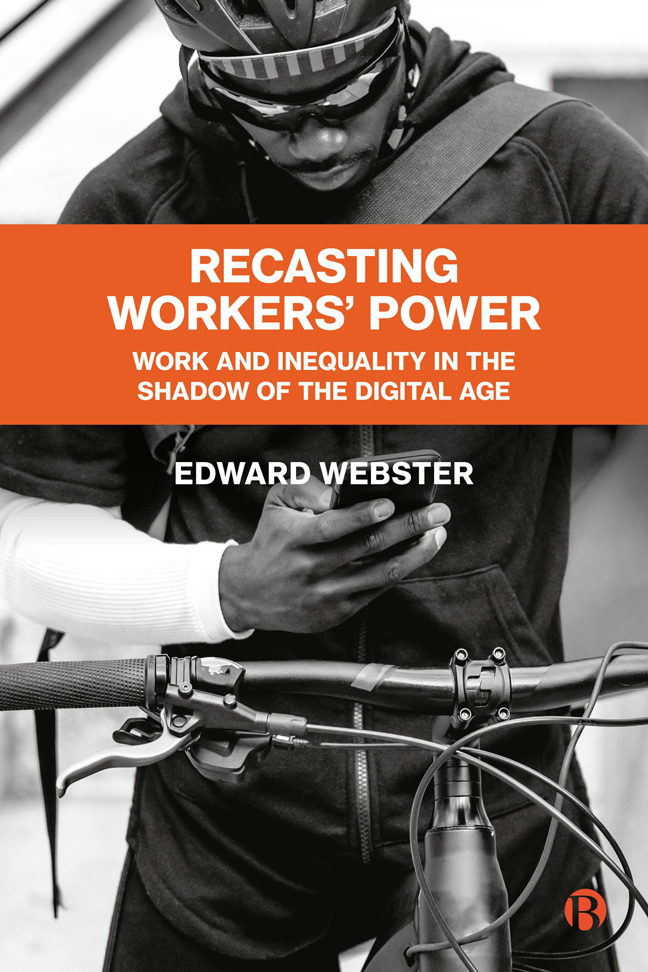Book contents
- Frontmatter
- Contents
- List of Figures and Tables
- List of Abbreviations
- Preface
- 1 The End of Labour? Rethinking the Labour Question in the Digital Age
- 2 Precarious Work after Apartheid: Experimenting with Alternative Forms of Representation in the Informal Sector
- 3 Neo-liberalism Comes to Johannesburg: Changing the Rules of the Game
- 4 Divided Workers, Divided Struggles: Entrenching Dualisation and the Struggle for Equalisation in South Africa's Manufacturing Sector
- 5 Authoritarian Algorithmic Management: The Double-edged Sword of the Gig Economies
- 6 Crossing the Divide: Informal Workers and Trade Unions
- 7 Global Capital, Global Labour: The Possibilities of Transnational Activism
- 8 Changing Sources of Power and the Future of Southern Labour
- Index
6 - Crossing the Divide: Informal Workers and Trade Unions
Published online by Cambridge University Press: 23 January 2024
- Frontmatter
- Contents
- List of Figures and Tables
- List of Abbreviations
- Preface
- 1 The End of Labour? Rethinking the Labour Question in the Digital Age
- 2 Precarious Work after Apartheid: Experimenting with Alternative Forms of Representation in the Informal Sector
- 3 Neo-liberalism Comes to Johannesburg: Changing the Rules of the Game
- 4 Divided Workers, Divided Struggles: Entrenching Dualisation and the Struggle for Equalisation in South Africa's Manufacturing Sector
- 5 Authoritarian Algorithmic Management: The Double-edged Sword of the Gig Economies
- 6 Crossing the Divide: Informal Workers and Trade Unions
- 7 Global Capital, Global Labour: The Possibilities of Transnational Activism
- 8 Changing Sources of Power and the Future of Southern Labour
- Index
Summary
In the preceding chapters we have identified four trends within the labour movement. First is the ongoing marginalisation through the process of informalisation, where unions face a further loss of members, resources and relevance. Second is dualisation, where unions defend existing strongholds and focus on those workers in stable jobs while neglecting the majority of precarious workers. Third, we showed how precarious workers are at the centre of accumulation strategies in the factories east of Johannesburg, where new collective worker struggles are emerging. However, these workers are being ‘remade’ as precarious workers and are not being organised by a traditional trade union but rather by an NGO. We call this substitutionism, as it describes a scenario where unions are no longer the only actors and other organisations such as NGOs, social movements and cooperatives fill the vacuum by providing specific services. In Chapter 5 we introduced another example of substitutionism: we identified the emergence of a new type of worker in the platform economy and hybrid forms of organisation being created in that arena. In this chapter we identify a fourth trend, one in which traditional unions successfully revitalise by crossing the divide and organising the new workers emerging in the informal economy.
The chapter grew out of our involvement in the TUiT project, designed to examine how unions change, innovate and pursue new strategies to face twenty-first-century capitalism. It was initiated by the FES in 2018 and was aimed at shifting the narrative on trade unions as ‘victims of globalisation’, and instead highlighting that they ‘do have agency and power’ (Herberg, 2018: 6). The project identified successful examples of how ‘labour can and already does shape globalization’; this included three examples of crossing the divide between the formal and informal in Africa – Ugandan transport workers, Kenyan security guards and Nigerian textile workers (Herberg, 2018: 6).
We have chosen the Ugandan transport union as the main case study as it demonstrates a successful example of union revitalisation in Africa. The union has been substantially transformed from 5,000 paid-up members 15 years ago to become a hybrid organisation – something between a traditional trade union and an informal association of micro-businesses. It is now one of the largest transport unions in Africa, with nearly 100,000 members.
- Type
- Chapter
- Information
- Recasting Workers' PowerWork and Inequality in the Shadow of the Digital Age, pp. 125 - 143Publisher: Bristol University PressPrint publication year: 2023

